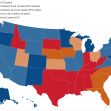As the U.S. Supreme Court considers overturning or severely restricting Roe v. Wade, one California legislator is proposing a bill that would prepare the state for the possible arrival of many women whose states restrict their right to choose.
Introduced by Senator Toni G. Atkins (D-San Diego), Senate Bill 1375 would ease restrictions on nurse practitioners’ ability to provide abortions without physician supervision during the first trimester of their pregnancies. In a press release from her office on March 2, the Senate President Pro Tempore said her bill would “help address the shortage of health care professionals projected for California.” The bill is co-authored by Assemblymember Jim Wood (D-Santa Rosa).
SB 1375 would also improve access to abortion for those in-state, especially women who live in lower-income communities that lack adequate medical clinics and other facilities. According to Atkins, more than 40% of California counties do not have facilities that provide reproductive services.
She stated, “Patients – especially pregnant people considering abortion –don’t have time to waste. That’s why it is so important that highly skilled, qualified nurse practitioners have the opportunity to practice independently, including the ability to provide first term abortions.” She called her bill a “proactive step further to increase access to affordable quality abortion care in California.”
She warned that “Our state is facing a serious shortage of primary care clinicians, especially for our Latino, Black and Native American communities—a problem that is expected to get even more dire over the next decade.”
Atkins’ bill would clarify several existing provisions of current law. Currently, nurse practitioners, nurse midwives and physicians’ assistants with special training and other qualifications can perform several reproductive-related services without physician supervision. To qualify, they must be certified by a nationally-accredited organization, have completed postgraduate training and have practiced full-time under a physician’s supervision for at least three years.
Current law, however, does not specifically mention abortion services while Atkins’ SB 1375 does. To qualify to perform first-trimester abortions, nurse practitioners must have been practicing for the equivalent of three years or 4,600 hours. With this qualification, they can provide abortions by aspiration techniques. University of Michigan Health explains that the procedure involves using a “gentle vacuum to remove tissue from a uterus. It is only used during the first trimester of pregnancy. Atkins’ bill would not allow it to be used with a viable fetus.
The aspiration technique is one of two medical procedures that are normally used during the first trimester. The other is by prescription pills taken during the first ten weeks of pregnancy to induce a miscarriage. Atkins’ bill does not include information about giving nurse practitioners the right to prescribe these pills.
Atkins told the Los Angeles Times that her new legislation “bridges the gap between two previous bills by including abortion among the services nurse practitioners can perform without the oversight of a doctor.”
The Times also predicted that the new provision is “likely to elicit concern from the doctors’ lobbying group, the California Medical Association, which has fought previous efforts to expand the scope of practice for nurse practitioners.” Thus far, however, the group has not released its position on the Atkins bill.
One well-known OB/GYN interviewed for this article saw the need for expanding the scope of nurse-practitioner services, but cautioned about setting limits. He noted that “more skills would be required after the first trimester.” He said that physician “back-up” should be available in case of trouble, and cautioned that no woman should come for any procedure without a companion. “I never want to see a woman receive an abortion, then immediately get in her car alone and drive back to Arizona,” he said.
Roe v. Wade currently gives women a constitutional right to an abortion during their first two trimesters, or 24 weeks, when a fetus is unable to survive outside the womb. The U.S. Supreme Court heard arguments about the right to abortion last December when considering Dobbs v. Jackson Women’s Health Organization, a Mississippi case that bans abortion after 15 weeks of pregnancy. The case asks the Supreme Court to return the decision about the legality of abortions back to each state. A Texas law passed in September 2021 prohibits abortions after fetal cardiac activity is detected, usually around six weeks.
An NPR headline on December 2, 2021, announced there are “21 states poised to ban or severely restrict abortion if Roe v. Wade is overturned.” They state that 100 million Americans, especially those in “nearly every Southern state and large swaths of the Midwest” will be denied access to legal abortions. While state bans would vary, most would place outright bans on abortion. Others would allow the procedure only in medical emergencies or cases of rape or incest.
During oral argument the U.S. Solicitor General Elizabeth Prelogar, appointed by President Biden, said abortion is “an incredibly difficult choice” and one that the court “for 50 years has recognized must be left up to (women) based on their beliefs and their conscience and their determination about what is best for the course of their lives.”
This right may soon disappear and if it does, laws such as the one proposed by Atkins would be more needed than ever.






